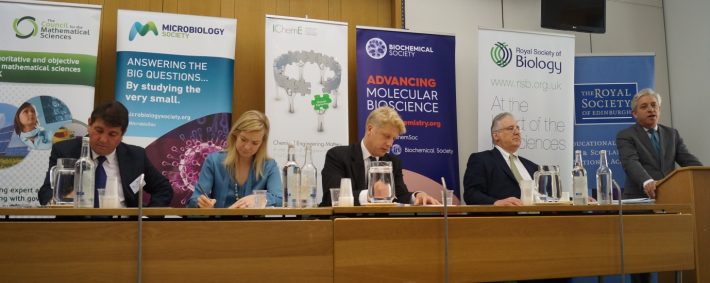Science After the Referendum: What next? Reporting from Parliamentary Links Day
The annual Parliamentary Links Day was packed this week as attendees gathered to hear a number of influential speakers on the topic: ‘Science After the Referendum: What next?’

Speakers included Science Minister, Jo Johnson MP; Speaker of the House of Commons, John Bercow MP and Science & Technology Select Committee Chair, Nicola Blackwood MP. There were more questions than time available as attendees raised their concerns about what the referendum means for UK science and research. It was clear that, despite their best intentions, the speakers were almost as much in the dark as the attendees, and it may be some time before we know what the true consequences of the historic referendum result will be.
Links Day is the largest annual science event in the Parliamentary calendar and it brings together scientists, learned societies and Members of Parliament. This year the event was not only extremely topical but highly emotive; being the second day Parliament had met since the UK voted to leave the EU. Attendees were understandably concerned with regards to the UK’s ability to access important European funding in the future, as well as the potential consequences of restricting the free movement of students and researchers between European countries.
We know UK science benefits from being in the EU, as concluded by the House of Lords Science and Technology Select Committee report published in April. A survey earlier this year by Nature, found that 78% of scientists thought that leaving the EU would be harmful to UK science so, it’s no wonder there is such unease across the scientific community at the moment.
What did the Science Minister have to say?
Science Minister Jo Johnson was keen to stress that nothing (legally) has changed while we remain in the European research area. He stated that “the referendum result has no immediate effect on those applying to or participating in Horizon 2020”. He encouraged the scientific community to continue to apply to European Funding. He also provided assurance that student loans for current EU students or those starting this year will not be affected, and confirmed that current plans for the Higher Education and Research Bill would continue. Jo Johnson also stated at the Links day that his task was now to “minimise the damage from the vote to leave the EU and maximise the opportunities that might arise from it”.
Nicola Blackwood MP suggests thinking creatively ….
Likewise Nicola Blackwood MP was keen to look for positives and to send an upbeat message to our European colleagues that the UK remains open for business. In her opening remarks at Links day, she commented that the consequences probably won’t be as bad as the Remain campaign stated, nor will it be as breezy as the Leave campaign made out. She stated that we need to think creatively about how to build an open community for science and technology, suggesting measures such as removing students from of the immigration figures, as well as having a shorter turnaround for visa applications so that we have a system that is more responsive to skills shortages. Finally, she called on the Treasury to “step in” should the UK lose access to EU science funding.
Can we form a united voice?
While it was to be expected that MPs would want to be reassuring at the Links day, it also became apparent that no clear plan for science had been prepared should the electorate vote to leave the EU. Citing business as usual to a sector so entwined with European funding streams and research programmes is not enough to alleviate concerns. As the president of the UK’s Royal Society Sir Venki Ramakrishnan highlighted, whilst UK Government science funding decline in real terms between 2010 and 2015; UK universities attracted approximately 14.2% of all UK income from EU research grants and contracts in 2014-15. So while thinking creatively, as Nicola Blackwood MP suggests, is going to be crucial, we also need the science community to come together to determine what we want in order to have a united voice for future negotiations; as called for by Dr. Sarah Main, Director at CaSE.
We issued a statement in response to the referendum result this week to ‘reassure all our members that we remain committed to fostering international collaborations, working with our sister European ecological societies and other partners. We will continue to engage with, provide opportunities for, and represent all our members, wherever they may live’. We would like to hear from you and hear what your concerns are. Please get in touch and let us know your vision for the future of the UK science and technology sector, and what the critical factors for future negations must be.
Like what we stand for?
Support our mission and help develop the next generation of ecologists by donating to the British Ecological Society.